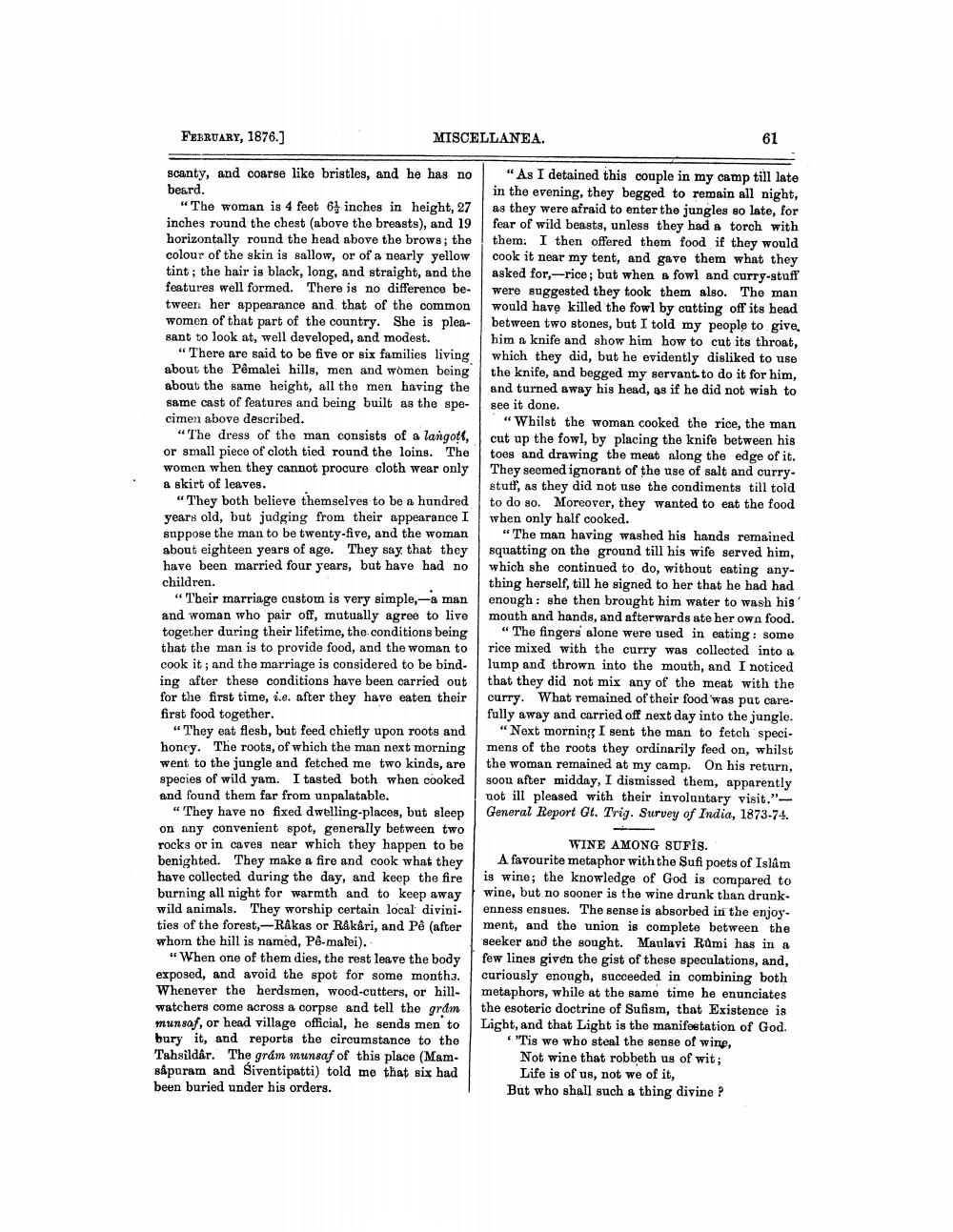________________
FEBRUARY, 1876.]
scanty, and coarse like bristles, and he has no beard.
MISCELLANEA.
"The woman is 4 feet 6 inches in height, 27 inches round the chest (above the breasts), and 19 horizontally round the head above the brows; the colour of the skin is sallow, or of a nearly yellow tint; the hair is black, long, and straight, and the features well formed. There is no difference between her appearance and that of the common women of that part of the country. She is pleasant to look at, well developed, and modest..
"There are said to be five or six families living about the Pêmalei hills, men and women being about the same height, all the men having the same cast of features and being built as the specimen above described.
"The dress of the man consists of a langott, or small piece of cloth tied round the loins. The women when they cannot procure cloth wear only
a skirt of leaves.
"They both believe themselves to be a hundred years old, but judging from their appearance I suppose the man to be twenty-five, and the woman about eighteen years of age. They say that they have been married four years, but have had no children.
"Their marriage custom is very simple,-a man and woman who pair off, mutually agree to live together during their lifetime, the conditions being that the man is to provide food, and the woman to cook it; and the marriage is considered to be binding after these conditions have been carried out for the first time, i.e. after they have eaten their first food together.
"They eat flesh, but feed chiefly upon roots and honey. The roots, of which the man next morning went to the jungle and fetched me two kinds, are species of wild yam. I tasted both when cooked and found them far from unpalatable.
"They have no fixed dwelling-places, but sleep on any convenient spot, generally between two rocks or in caves near which they happen to be benighted. They make a fire and cook what they have collected during the day, and keep the fire burning all night for warmth and to keep away wild animals. They worship certain local divinities of the forest,-Râkas or Râkâri, and Pê (after whom the hill is named, Pê-malei).
"When one of them dies, the rest leave the body exposed, and avoid the spot for some monthз. Whenever the herdsmen, wood-cutters, or hillwatchers come across a corpse and tell the gram munsaf, or head village official, he sends men to bury it, and reports the circumstance to the Tahsildar. The grám munsaf of this place (Mamsapuram and Siventipatti) told me that six had
been buried under his orders.
61
"As I detained this couple in my camp till late in the evening, they begged to remain all night, as they were afraid to enter the jungles so late, for fear of wild beasts, unless they had a torch with them: I then offered them food if they would cook it near my tent, and gave them what they asked for,-rice; but when a fowl and curry-stuff were suggested they took them also. The man would have killed the fowl by cutting off its head between two stones, but I told my people to give, him a knife and show him how to cut its throat, which they did, but he evidently disliked to use the knife, and begged my servant- to do it for him, and turned away his head, as if he did not wish to see it done.
"Whilst the woman cooked the rice, the man cut up the fowl, by placing the knife between his toes and drawing the meat along the edge of it. They seemed ignorant of the use of salt and currystuff, as they did not use the condiments till told to do so. Moreover, they wanted to eat the food when only half cooked.
"The man having washed his hands remained squatting on the ground till his wife served him, which she continued to do, without eating anything herself, till he signed to her that he had had enough she then brought him water to wash his mouth and hands, and afterwards ate her own food.
"The fingers alone were used in eating: some rice mixed with the curry was collected into a lump and thrown into the mouth, and I noticed that they did not mix any of the meat with the curry. What remained of their food was put carefully away and carried off next day into the jungle.
"Next morning I sent the man to fetch specimens of the roots they ordinarily feed on, whilst the woman remained at my camp. On his return, soon after midday, I dismissed them, apparently not ill pleased with their involuntary visit."General Report Gt. Trig. Survey of India, 1873-74.
WINE AMONG SUFIS.
A favourite metaphor with the Sufi poets of Islâm is wine; the knowledge of God is compared to wine, but no sooner is the wine drunk than drunkenness ensues. The sense is absorbed in the enjoyment, and the union is complete between the seeker and the sought. Maulavi Rumi has in a few lines given the gist of these speculations, and, curiously enough, succeeded in combining both metaphors, while at the same time he enunciates the esoteric doctrine of Sufism, that Existence is Light, and that Light is the manifestation of God. "Tis we who steal the sense of wine, Not wine that robbeth us of wit;
Life is of us, not we of it, But who shall such a thing divine ?




